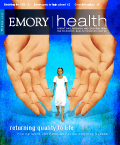HPV uncensored

Not your parents’ curriculum
Lisa Flowers’ lesson for students at the New Schools at Carver starts up close and personal. The Emory gynecologist is projecting pictures of a cancer lesion on the cervix, followed by another picture of the anal canal infected with genital warts. She already has the room’s attention when she asks, “Do you want these warts on your penis?”
| In this section |
Flowers will launch her full curriculum, “HPV Uncensored,” at two Atlanta schools, Grady High School and the New Schools at Carver this spring. The course, offered once a week over 14 weeks, drives home the point that the human papilloma virus (HPV), a sexually transmitted disease, can cause cervical cancer. And just as important, it is preventable.
“Often kids don’t relate to cancer because they think it is an old person’s disease,” says Flowers, “but they need to know that cervical cancer can affect women as young as 28.”
Parents were on board with the program well before Flowers ever entered the Carver classroom. In fact, she wants to reach and educate parents as much as their students. Along with the classroom teacher, Candace Henry, and several Emory medical students, she held an open house for parents to explain what they would cover in the classes and why. “We get the parents on board so they don’t think we’re trying to get their kids to have sex,” Flowers says. “Sometimes, there is a fear that if we talk about sex, that will encourage kids to have sex. That simply is not true. Information prevents disease. I believe in the power of information.”
Why does Flowers believe that this curriculum belongs in the high schools? Many kids initiate sexual activity as early as 12, she says, and she wants to spread the power of information while there is still time. “We could offer the course in college, but by then, we’ve really missed the boat,” says Flowers.
The curriculum is hands-on. With help from Emory medical students, Flowers presents real-life case studies, leads games to reinforce the information, leads role play exercises to involve the teens, and assesses knowledge, health practices, and behavioral actions related to sexually transmitted infections (STIs). “We make them think of the risk factors of a STI. We make a point of making it real.”
At the program’s end, the high schoolers have learned to call body parts by their correct names rather than slang terms, they’ve explored models of bodies, and they’ve learned that HPV causes cancer and that they can prevent it. For their final assignment, they make a group presentation to their community and parents, sharing the knowledge of what they’ve learned about STIs and HPV with others.
This winter and spring, Flowers will work with students at Emory’s Rollins School of Public Health to measure the effectiveness of the curriculum and refine it based on the results. —Rhonda Mullen


